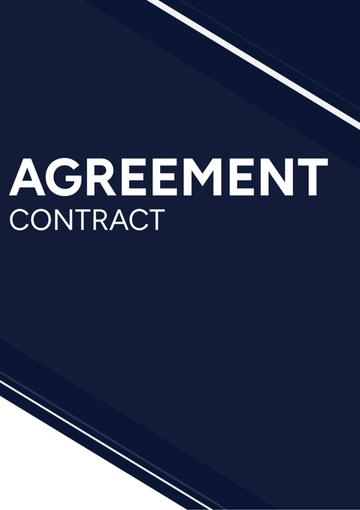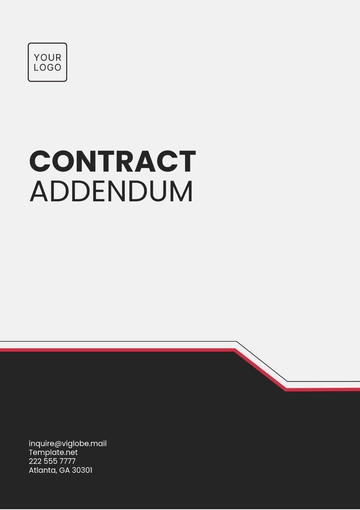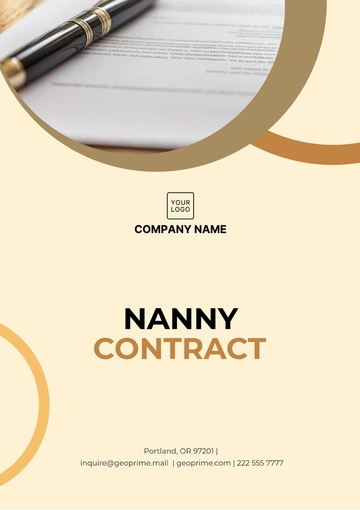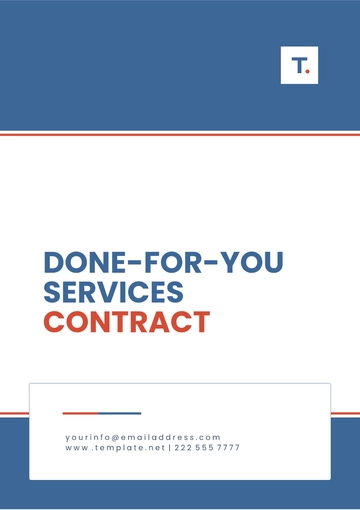Free Sales Contract Management Strategy Document
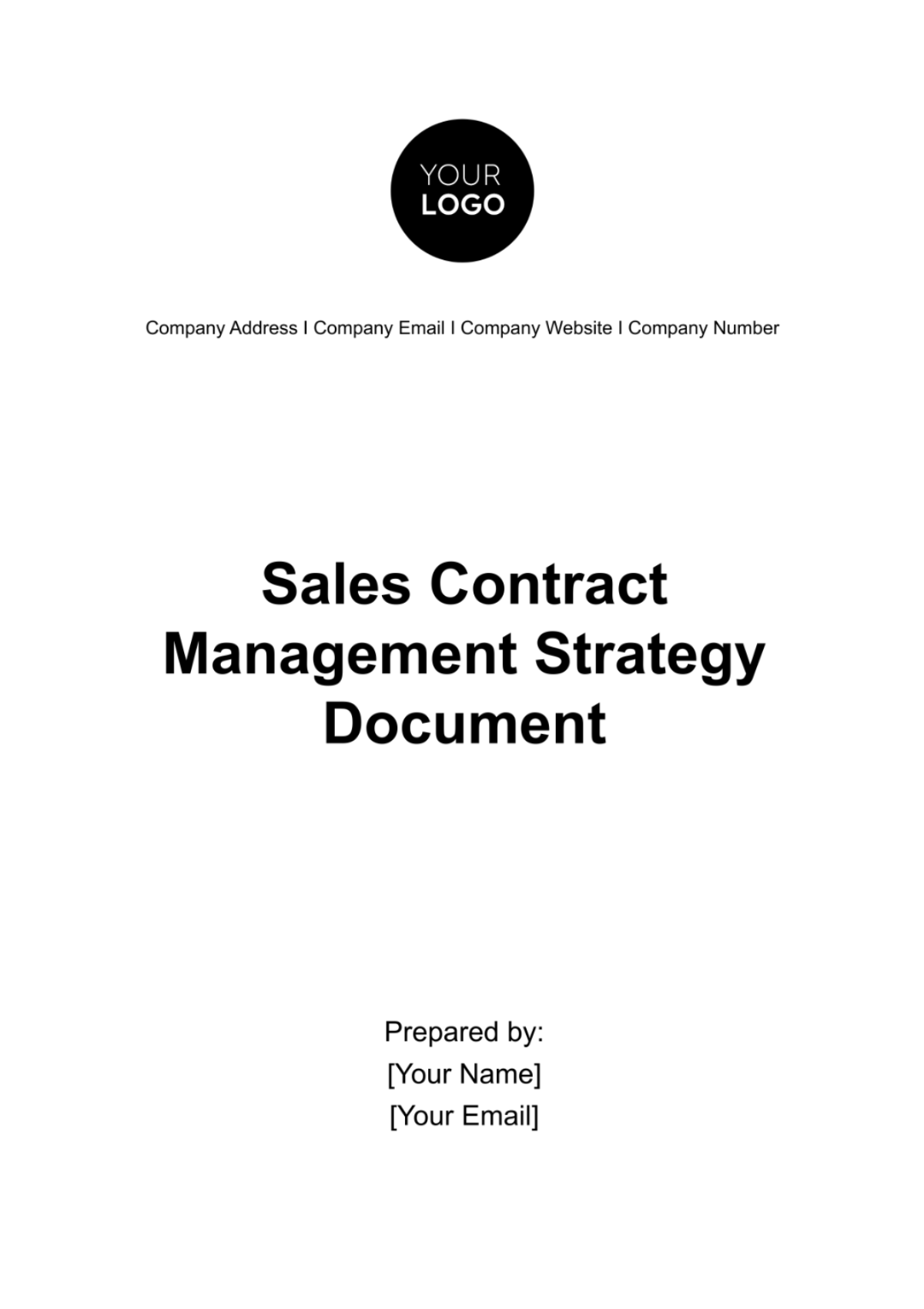
I. EXECUTIVE SUMMARY
In the ever-evolving landscape of sales and business, effective contract management stands as the linchpin to our continued success at [Your Company Name]. This document is a blueprint for navigating the complexities of the modern business environment.
The management of sales contracts is more than just an administrative function; it is a strategic imperative. Our organization recognizes that each contract signifies a unique partnership and opportunity. A well-structured approach to contract management ensures we deliver on our promises, secure our interests, and foster long-lasting, fruitful relationships with our clients.
This document not only outlines our approach to contract management but also underscores the core principles we uphold. It serves as a guide to uphold our commitment to excellence, ethical practice, and client satisfaction in our sales contracts.
II. INTRODUCTION
Defining Contract Management
At its core, contract management within [Your Company Name] is a dynamic process that encompasses the end-to-end journey of a sales contract. It starts with understanding our clients' needs, culminating in the negotiation and execution of agreements, and extends into the realm of post-contract management, where we ensure that both parties live up to their promises.
Scope of this Document
This Sales Contract Management Strategy Document delves into the strategies and tactics that [Your Company Name] will employ to ensure the seamless, transparent, and efficient management of sales contracts. It aims to provide a coherent framework within which we approach each contract, from inception to post-execution management.
In the pages that follow, we will elaborate on the objectives, delineate the roles and responsibilities of our teams, elucidate the phases of the contract lifecycle, and outline the strategies for risk management, utilization of technology and tools, as well as the importance of training and development for our teams. The objective is clear: to provide our clients with unmatched service, to uphold the highest legal and ethical standards, and to embrace a continuous improvement mindset that drives us to do better, each day, every day.
III. OBJECTIVES
Key Objectives
Streamline contract processes to reduce administrative burden: One of our primary objectives is to optimize the entire contract lifecycle, from creation to execution and post-contract management. We aim to implement efficient workflows, automate routine tasks, and minimize manual administrative efforts. By doing so, we will reduce the time and resources spent on contract management, allowing our teams to focus on delivering exceptional service to our clients.
Improve contract compliance and risk management: Ensuring that our contracts adhere to legal and regulatory standards is paramount. Our goal is to enhance our legal compliance measures, including rigorous legal reviews and adherence to industry-specific regulations. Simultaneously, we aim to strengthen our risk management strategies by proactively identifying and mitigating potential risks associated with our contracts. By doing this, we can minimize legal disputes, financial losses, and operational disruptions.
Enhance client satisfaction through transparent and efficient contract management: At the core of our strategy is the unwavering commitment to our clients' satisfaction. We intend to provide a seamless and transparent experience throughout the contract lifecycle. This includes improving communication with clients, maintaining complete transparency regarding contract terms and obligations, and fostering a client-centric approach to contract management. We believe that by delivering on these objectives, we can strengthen our client relationships, boost their confidence in our services, and foster long-term partnerships built on trust and value.
Increase contract performance and accountability: We aim to set clear performance metrics and accountability standards for our contracts. This includes establishing key performance indicators (KPIs) that align with client expectations, monitoring these KPIs, and regularly reporting on contract performance. By creating a culture of accountability, we ensure that both parties uphold their commitments, leading to successful contract outcomes and satisfied clients.
Optimize financial management: Effective contract management goes beyond legal and administrative aspects. It also involves financial management, including accurate invoicing, timely payments, and budget adherence. Our objective is to improve our financial management processes to reduce delays in payments, prevent financial discrepancies, and enhance overall financial transparency in our contract relationships.
IV. ROLES AND RESPONSIBILITIES
Team Structure Table
ROLE | DESCRIPTION | DUTIES |
|---|---|---|
Contract Managers | They are responsible for overseeing the entire contract lifecycle, from creation to execution and beyond. | Collaborating with sales representatives to understand client requirements and expectations. Drafting and editing contracts to ensure clarity and compliance with legal and regulatory standards. Coordinating the legal review and approval process with our legal counsel. |
Legal Counsel | Legal Counsel plays a critical role in ensuring the legal integrity of contracts. | Providing legal expertise to contract managers during the negotiation and execution phases. Reviewing contracts to identify and mitigate legal risks. Advising on legal compliance with industry-specific regulations and applicable laws. |
Sales Representatives | Sales Representatives are often the initial point of contact with the clients and play a pivotal role in the contract management process. | Engaging in thorough client consultations to understand their needs and objectives. Collaborating with the contract managers during the negotiation phase to reach mutually agreeable terms. |
Finance Team | They are responsible for overseeing the financial aspects of contracts. | Conducting financial analysis to ensure that contract terms are viable and align with the company's financial goals. |
Client Relationship Managers | Client Relationship Managers focus on maintaining strong and mutually beneficial relationships with clients. | Ensuring that clients receive the necessary support and attention throughout the contract lifecycle. |
Collaborative Synergy
The success of our contract management strategy is rooted in the collaborative synergy among these teams and individuals. Clear communication, transparency, and the diligent execution of their respective roles are essential to achieving our contract management objectives. Through this collaborative effort, we aim to enhance client satisfaction, reduce risks, and drive our business forward.
V. CONTRACT LIFECYCLE PHASES
Phase 1: Contract Creation
Client Consultation and Needs Assessment: Before drafting any contracts, a thorough understanding of the client's needs is essential. This phase involves direct communication with the client to identify their objectives, expectations, and specific requirements.
Drafting and Editing Contracts: Once the client's needs are clear, the contract creation begins. This involves drafting an initial contract that outlines the terms, conditions, and deliverables. Detailed scrutiny is carried out to ensure clarity and completeness. The contract is then edited as necessary.
Legal Review and Approval: After internal editing, the contract goes through legal review to verify its compliance with laws and regulations. Legal experts examine the document, make any required changes, and provide their approval.
Phase 2: Contract Negotiation
Collaborative Discussions with Clients: Negotiation is a critical phase in contract management. This stage involves open and constructive dialogues with clients to address any concerns or disputes. The goal is to reach a mutually beneficial agreement that satisfies both parties.
Amendments and Revisions: During negotiations, amendments and revisions to the contract may be necessary. These changes are documented, and both parties need to agree to them for them to take effect.
Finalization and Mutual Agreement: Once all parties are in agreement, the final contract is prepared, incorporating any negotiated changes. Signatures and approvals are sought to formalize the agreement.
Phase 3: Contract Execution
Signatures and Notarization (if required): Contracts require the signatures of authorized representatives from both the client and your company. In some cases, notarization may be necessary to validate the contract legally.
Effective Date Determination: The contract should specify the date it becomes effective, which could be the date of signing or a future date as agreed upon by both parties.
Distribution to Relevant Parties: The executed contract is distributed to all relevant parties, including the client, internal teams responsible for implementation, and legal counsel.
Phase 4: Post-Contract Management
Compliance Monitoring: After the contract is in effect, ongoing compliance with its terms and conditions is essential. A system is established to monitor adherence to the contract and track any necessary performance indicators.
Renewals and Amendments: Many contracts require periodic renewals or may need amendments as circumstances change. The contract management team is responsible for tracking these dates and managing renewals and modifications as required.
Dispute Resolution and Termination: In the unfortunate event of disputes or the need for contract termination, well-defined procedures are in place. These may include negotiation, mediation, arbitration, or legal action if necessary. Proper documentation of disputes and resolution steps is crucial for future reference.
VI. RISK MANAGEMENT
Risk Identification
Effective risk management is critical to ensuring the smooth execution of contracts. Identifying potential risks and vulnerabilities is the first step in this process:
Legal Compliance: One of the primary concerns in contract management is ensuring compliance with all relevant laws and regulations. Failing to do so can lead to legal disputes, fines, and damage to the company's reputation. It is essential to keep abreast of changes in legislation and industry standards that may impact contracts.
Payment Defaults: Another common risk is the possibility of payment defaults by clients. This can disrupt cash flow and affect the company's financial stability. Understanding the financial health of the client and setting clear payment terms in the contract is crucial to mitigate this risk.
Scope Changes: In some cases, clients may request changes or additions to the contract's scope after it has been agreed upon. These changes can impact the project's timeline, cost, and resources. Managing scope changes effectively is vital to prevent disputes and project delays.
Force Majeure Events: Unforeseen events, such as natural disasters, pandemics, or political instability, can disrupt contract execution. Companies need to have strategies in place to address force majeure events, which might include postponing delivery dates, altering terms, or terminating the contract.
Risk Mitigation
Once risks are identified, it is crucial to implement strategies to mitigate them:
Robust Legal Review: Legal experts should thoroughly review all contracts to ensure they comply with current laws and regulations. This review should also identify potential legal pitfalls and suggest ways to avoid them.
Clear Dispute Resolution Procedures: Contracts should include well-defined dispute resolution procedures. These procedures should outline how conflicts will be resolved, whether through negotiation, mediation, arbitration, or litigation. Having these procedures in place can prevent protracted legal battles and maintain client relationships.
Thorough Financial Analysis: An in-depth financial analysis of the client's creditworthiness is essential to mitigate payment defaults. Companies can use credit checks and financial analysis tools to assess a client's ability to meet their financial obligations. Additionally, setting clear payment terms and providing payment options can reduce the risk of defaults.
Regular Contract Audits: Regularly auditing and reviewing contracts can help companies proactively address risks. By periodically assessing the ongoing performance and compliance with the terms, companies can identify and resolve issues before they escalate into major problems.
VII. TECHNOLOGY AND TOOLS
Here are the key aspects of technology and tools for effective sales contract management:
Contract Management Software
Implementing robust contract management software can revolutionize your approach to handling sales contracts. Some of the key functionalities include:
Document Repository: A centralized repository for storing contracts, making them easily accessible to authorized team members.
Automated Alerts: Set up automated notifications for key contract dates, such as renewal, milestones, or termination, reducing the risk of missing critical events.
Version Control: Maintain a clear record of contract revisions, facilitating a comprehensive audit trail.
Search and Retrieval: Efficiently search, retrieve, and review contracts with advanced search capabilities.
Data Analytics: Utilize data analytics to gain insights into contract performance, identify bottlenecks, and make data-driven decisions.
Communication Tools
Effective communication with clients and internal teams is vital for successful contract management. Utilize the following tools:
Secure Email Platforms: Implement secure email and communication platforms to safeguard sensitive contract-related information.
Document Sharing: Employ secure, cloud-based document-sharing solutions that allow controlled access to contracts, ensuring data confidentiality.
Client Portals: Create client portals to facilitate transparent and collaborative communication. Clients can log in to view their contract's status, make inquiries, and provide feedback.
Integration with CRM and ERP Systems
Integrating your contract management system with Customer Relationship Management (CRM) and Enterprise Resource Planning (ERP) systems can enhance efficiency:
Streamlined Data Transfer: Automate the transfer of critical contract data into CRM and ERP systems, reducing manual data entry errors and enhancing the quality of data.
Comprehensive Data Analysis: Access detailed information about the performance of contracts, customer relationships, and financial data. This integration allows for better decision-making and strategic planning.
Compliance Monitoring Tools
Compliance is paramount in contract management. Invest in tools that help monitor and maintain adherence to legal requirements:
Compliance Tracking: Use specialized compliance monitoring tools to track adherence to specific legal regulations, industry standards, and internal policies.
Audit Capabilities: Enable easy audit of contracts to ensure that all obligations, terms, and conditions are met, mitigating potential risks associated with non-compliance.
Workflow Automation
Streamline repetitive tasks and ensure consistent processes with workflow automation tools:
Automation of Routine Tasks: Automate routine processes, such as contract approvals, notifications, and reporting, to reduce manual workload and ensure consistency.
Customizable Workflows: Tailor workflows to suit the specific needs of different contract types, ensuring that the process is aligned with the complexity of the agreement.
Incorporating these technology and tools into your sales contract management strategy will empower your organization to operate more efficiently, improve collaboration, reduce risks, and enhance compliance.
VIII. TRAINING AND DEVELOPMENT
Regular Training Sessions on Contract Management
We will conduct regular training sessions to keep our team updated on the latest industry standards, legal requirements, and best practices in contract management. These sessions will cover various aspects, including:
Legal Updates: Training on changes in laws and regulations that may impact our contracts.
Contract Lifecycle: In-depth understanding of each phase of contract management.
Negotiation Skills: Enhancing the art of negotiation and conflict resolution.
Data Security: Training on maintaining the security of contract-related information.
Legal and Compliance Updates
In the ever-evolving legal landscape, it's crucial to stay updated on new regulations and compliance requirements. [Your Company Name] will regularly provide legal and compliance updates to the contract management team, ensuring that all contracts meet the latest legal standards.
Soft Skills Development for Negotiations
Effective negotiation is a core skill in contract management. We will invest in training that focuses on interpersonal skills, communication, and conflict resolution techniques. This will empower our team to navigate complex negotiations and maintain positive client relationships.
IX. CONTINUOUS IMPROVEMENT
Feedback Mechanism
To gather valuable insights and feedback, we will implement the following mechanisms:
Client Feedback: We will regularly seek input from our clients regarding their experiences with our contracts and contract management team.
Sales Team Input: Our sales teams are on the front lines of client interactions and negotiations. We will regularly engage with them to understand the practical challenges they face.
Post-Contract Analysis: After the conclusion of each contract, we will conduct a detailed analysis to assess what worked well and what could be improved.
X. CONCLUSION
This strategy document provides a roadmap for [Your Company Name] to excel in contract management. By fostering transparent communication, ensuring legal compliance, and consistently improving processes, we aim to strengthen client relationships and achieve our objectives.
- 100% Customizable, free editor
- Access 1 Million+ Templates, photo’s & graphics
- Download or share as a template
- Click and replace photos, graphics, text, backgrounds
- Resize, crop, AI write & more
- Access advanced editor
Unlock seamless contract management with Template.net’s Sales Contract Management Strategy Document template. Tailored for businesses in various industries, this comprehensive document outlines a proven strategy for contract creation, negotiation, execution, and post-contract management. Enhance compliance, mitigate risks, and strengthen client relationships effortlessly with our product that you can customize with our AI editor tool and get started today!
You may also like
- Rental Contract
- Contractor Contract
- Contract Agreement
- One Page Contract
- School Contract
- Social Media Contract
- Service Contract
- Business Contract
- Restaurant Contract
- Marketing Contract
- Real Estate Contract
- IT Contract
- Cleaning Contract
- Property Contract
- Supplier Contract
- Partnership Contract
- Food Business Contract
- Construction Contract
- Employment Contract
- Investment Contract
- Project Contract
- Payment Contract
- Student Contract
- Travel Agency Contract
- Startup Contract
- Annual Maintenance Contract
- Employee Contract
- Gym Contract
- Event Planning Contract
- Personal Contract
- Nursing Home Contract
- Law Firm Contract
- Work from Home Contract
- Software Development Contract
- Maintenance Contract
- Music Contract
- Amendment Contract
- Band Contract
- DJ Contract
- University Contract
- Salon Contract
- Renovation Contract
- Photography Contract
- Lawn Care Contract

